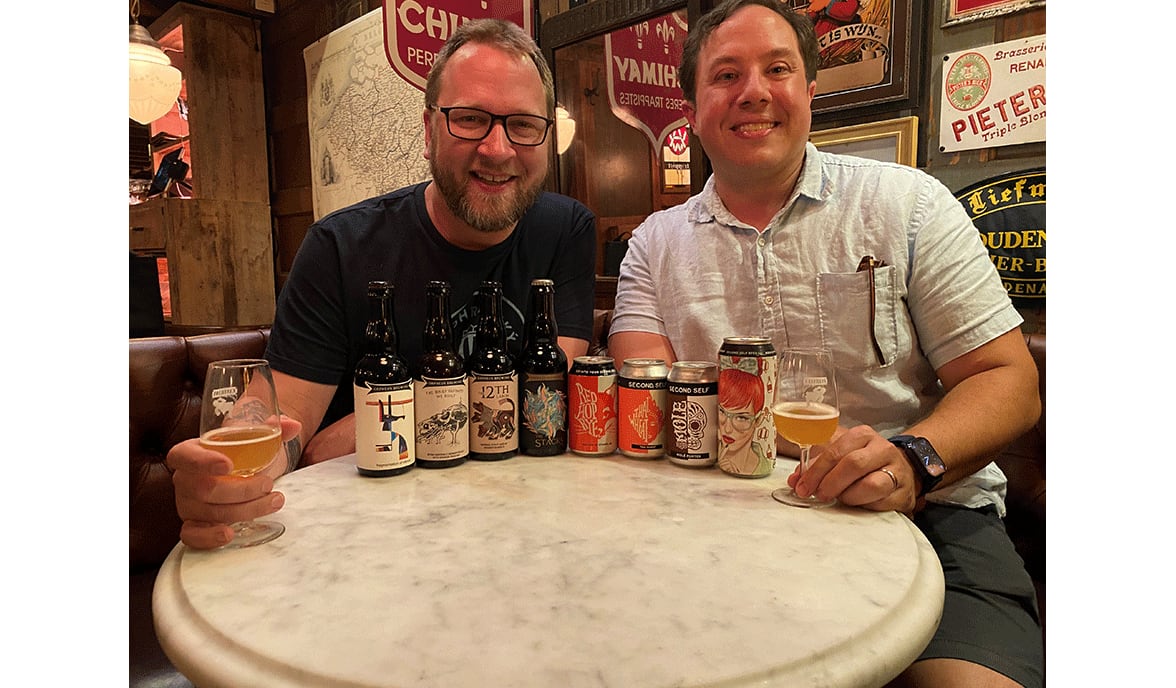Back in March 2017, after the passage of Senate Bill 85, allowing Georgia consumers to purchase beer at the brewery where it is made, I wrote these words in an AJC Beer Town column:
“I’m happy to report that this may be the last time I will ever need to write about Georgia beer laws in a negative way. And if all goes according to plan, I will never again proffer a horrible headline that asks, ‘Is Georgia the worst state in the U.S. for craft brewing?’”
Some six years later, I’m sad to report that I was wrong.
Breweries in neighboring Southeastern states can self-distribute beer to retailers, ship directly to consumers and do a host of other things that Georgia brewers can’t do. And that’s hurting small breweries here in a big way.
Anderby Brewing, Candler Rail Brewery, Orpheus Brewing and Second Self Beer Co. all closed this year. Atlanta Brewing Co. and Burnt Hickory Brewery are said to be on hiatus while working on opening new locations.
Credit: Anderby Brewing Facebook page
Credit: Anderby Brewing Facebook page
Founded by Jason Pellett, Orpheus Brewing opened in Midtown Atlanta in 2014. It closed this spring, after nine years in business.
Founded by Chris Doyle and Jason Santamaria, Second Self Beer Co. opened on Atlanta’s Westside in September 2014. It closed in June.
The two Jasons, Pellett and Santamaria, have similar stories to tell.
Credit: Bob Townsend
Credit: Bob Townsend
They both used United Distributors, the largest beverage alcohol wholesaler in Georgia. And both Pellett and Santamaria thought about closing their breweries during the pandemic, but decided to persevere.
“Beerwise, 2017 and 2018 were our peak years,” Santamaria said. “We were doing great with United, and then we hit a cliff. We dropped 60% of our sales in one quarter, and we were never able to recover after that.”
Pellett agreed that 2017 was the peak, in terms of volume, “but we never really made money. The overhead was too much. During the pandemic, we actually used (Paycheck Protection Program) money to hire people. That’s what it was supposed to be for. But we didn’t quite get there before the money ran out.”
Credit: Carolyn Desalu
Credit: Carolyn Desalu
Santamaria has returned to his old job in software sales for IBM.
“I’m doing that at least until I figure out what I really want to do when I grow up,” he said. “I don’t have a desire to start my own brand again, but I would like to get to a spot where I could help other people get started.”
Pellett is moving to Amsterdam, in the Netherlands, where he’ll contract brew.
“The laws are gentler over there,” he said. “I’ll be making stouts and barleywines, and no doubt an IPA — or four. But we’re going to be very small, so we can make whatever we want, and I can self-distribute out of my house.”
Preston Smelt opened Anderby Brewing on Technology Parkway in Peachtree Corners in 2019. It closed on July 3, just shy of its fourth anniversary.
The pandemic was the biggest problem for Smelt’s small taproom brewery.
“In 2018, when I signed my lease here, Tech Park was packed with people and businesses,” he said. “All the buildings were full, and it was a thriving technology center. Now, the buildings are still fully leased, but nobody goes to work anymore. I picked a location that needed foot traffic Mondays through Fridays, and that’s nonexistent.”
Smelt isn’t sure whether self-distribution would have helped him, but he’s amazed that North Carolina breweries can sell and self-distribute 50,000 barrels a year — and he has a list of other things he thinks would help in Georgia.
“Just the ability to serve somebody’s product other than your own would help a lot,” he said. “You can do that in Florida. In North Carolina, you’re allowed to sell beer at a local farmers market. That would have helped us, too.”
Smelt, who is back at his old corporate job as an economist, predicted that “there will be many more brewery closings this year. I was not first, and I won’t be the last.”
Joseph Cortes is executive director of Georgia Craft Brewers Guild, a trade organization that advocates for the kinds of laws that make it easier for small breweries to compete in the marketplace.
“The brewery closures really highlight the sense of urgency in the industry,” Cortes said. “I think it’s pretty easy to say that none of these breweries closed for one single reason. But I think it’s also pretty easy to say that small breweries in Georgia operate in a highly restrictive system.
“In fact, it still remains one of the most restrictive systems of regulation nationwide.”
Leading up to the 2024 Georgia legislative session, the Georgia Craft Brewers Guild is planning a more aggressive push for changes in the law. But, as in previous years, it will be an uphill battle, because of the beer distributors lobby’s money and influence.
“We have a pretty strong case to make,” Cortes said. “All the economic and market pressures that everyone’s facing are compounded by the need to operate in a system that’s fair.”
Limited self-distribution is at the top of the list, because it would give small breweries the opportunity to get their beer out to more consumers and help grow their brands.
The next step would be franchise reform, Cortes said, “because right now small breweries are wrapped up in a system that gives them zero ability and zero leverage to change wholesalers.”
Bart Watson, chief economist for the Brewers Association, has a rosier outlook on the nationwide craft beer business, noting in an email that, in the past decade, “we’ve had an extraordinary number of openings and very few closings.”
But he did allow that Georgia might be an outlier.
“With all of that national context, Georgia does have an environment with less market access than many states, and it’s possible that’s a contributing factor for closings in Atlanta and Georgia,” Watson said.
He added that the lack of self-distribution (available in most of the U.S., including North Carolina, though not Florida) and strict limits on daily off-premises sales (packaged to go) “limit the ability of breweries in Georgia to follow proven business models that have worked in other states.”
Georgia beer drinkers will be watching and waiting to see if and when more of the state’s breweries close. And, in 2024, more of them might be following Cortes up the state Capitol steps to voice their concerns.
Sign up for the AJC Food and Dining Newsletter
Read more stories like this by liking Atlanta Restaurant Scene on Facebook, following @ATLDiningNews on Twitter and @ajcdining on Instagram.
About the Author
The Latest
Featured






